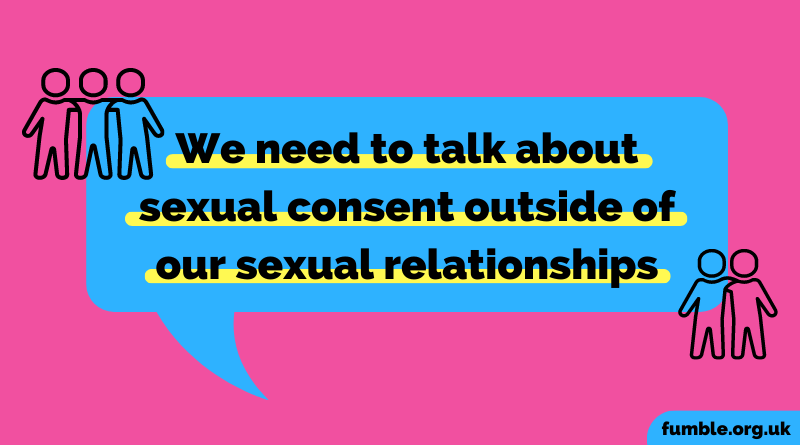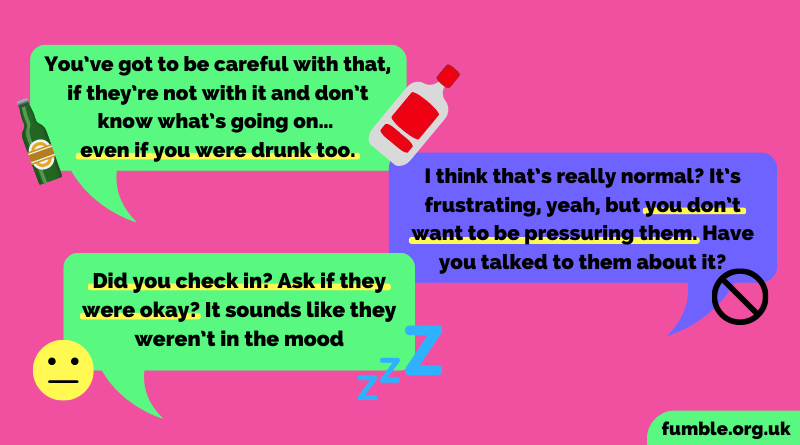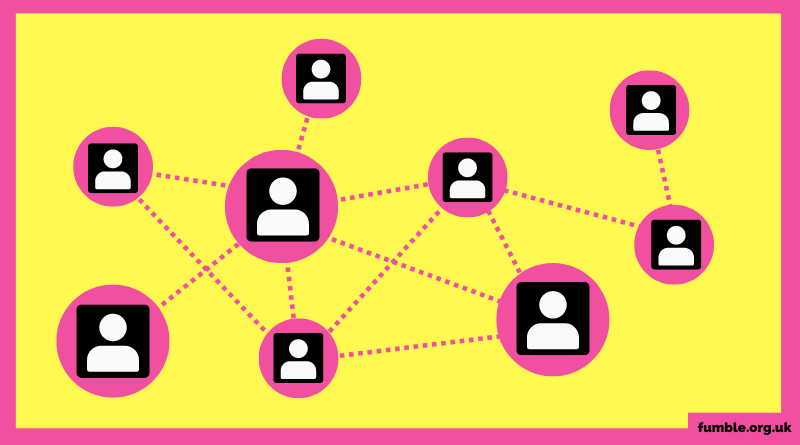Why we need to be talking to our friends about sexual consent
Sexual consent isn’t just a topic for people we’re having sex with – we need to be talking about it with our friends too
We need to be talking about sexual consent outside of our sexual relationships. This may feel like a strange idea at first! Surely sexual consent is only relevant to talk about with the person you’re having sex with? But, actually, this topic is too important to keep private, behind closed doors or solely between sexual partners.
Jump straight to our Getting help section below if you want to access support around any experiences of sexual violence and unwanted sexual behaviour.
Why should we talk about sexual consent to friends?
Sexual consent can feel really tricky, despite the oversimplified idea that it’s ‘just’ about saying yes/no to what we want sexually. There are lots of reasons for this:
📢 Myths and misconceptions surrounding sexual violence push the false idea that most sexual assaults and rape are committed by strangers. Rape Crisis shows this isn’t true.
📢 A lot of us find it hard to say a direct ‘no’ to sex.
📢 Most of us grew up without adequate, quality sex education that taught us about sexual consent, and communicating boundaries (among many other things!)
📢 Porn has unfortunately filled this ‘sex education’ gap for lots of people. Among other things, mainstream porn rarely shows realistic sexual consent chat.
When you think about sexual consent as navigating sexual desire and rejection, it’s not really that surprising that it feels complicated. Rejection is hard, whether you’re the one doing the rejecting or the one being rejected. It’s especially hard when it involves someone you have feelings for. Then there’s the stigma and shame that still surrounds sexual desire and pleasure, particularly for women and people assigned female at birth. It’s a lot to try and work out with another person.

So, we need to be talking about all of this more. There may also be a particular reason why it feels important to talk to a friend (or someone else close to you). Perhaps you’re worried a friend doesn’t understand the importance of sexual consent, how to listen and check in, and that they’re pressuring someone into sex. Perhaps you’re worried your friend’s having sex when they don’t actually want it, and they don’t feel able to say so. Neither of these situations are okay. As their friend, you may want to say something. Here’s some support and suggestions on how to bring it up.
What if I know/see my friend is pressuring people into sex?
Knowing your friend is pressuring people to have sex with them is a really uncomfortable and challenging situation to navigate, but it’s also incredibly important to acknowledge.
The majority of sexual assaults and rape are committed by someone the survivor knows. As much as we like to think that strangers are more of a risk, and that the people we know aren’t capable of sexual violence, statistically this isn’t the case. We can do a lot by having conversations with each other about sexual consent and calling each other out on any bad behaviour, even if that’s ‘just’ inappropriate comments that disregard consent.
Most of these situations aren’t as black and white as we expect. For example, it usually won’t be as extreme as: an ‘evil’ person maliciously going out of their way to violate other people. Actually, because most of us haven’t had decent consent education, perhaps you don’t think their behaviour is malicious. Regardless, there’s no excuse. No-one is entitled to have sex with anyone else. No-one should be pressuring or expecting anyone else to have sex with them.
Here are some examples of responses you could give, if they make a comment that worries you (inspired by The Mix).
⛔ If your friend tells you they were both drunk or intoxicated:
“You’ve got to be careful with that, if they’re not with it and don’t know what’s going on… even if you were drunk too/you don’t want to be ‘that person’.”
⛔ If your friend is complaining that their partner isn’t into sex at the moment:
“I think that’s really normal? I get it’s frustrating, but you don’t want to be pressuring them, that’s not good. Have you talked to them about it?”
⛔ If your friend tells you their partner (or someone they had sex with) didn’t look ‘into it’ and was unresponsive:
“Did you check in? Ask if they were okay? It sounds like they weren’t in the mood, it’s always worth checking.”
⛔ If you see something that doesn’t feel okay and it looks like your friend is taking advantage of someone:
If you feel able to step in, you could check in and ask: “Are you sure they’re okay?” It’s also good to ask the person themselves how they’re feeling, if you can. You could intervene more directly with something like: “They’re way too drunk and out of it, let’s get them a cab.” This isn’t about any superhero moves, it’s just about flagging that you’ve noticed something isn’t right, and making sure the friend knows you’ve noticed. This could be enough to deescalate the situation.

What if I think my friend is having sex when they don’t actually want to?
Hearing about your friend being pressured into sex is another really uncomfortable and hard situation to navigate. Not understanding sexual consent can go the other way too. If saying no feels hard, sometimes people find it easier to go ahead with sex instead. But just talking about it could really help them, especially if you’re able to talk about all the different ways to communicate a ‘no’, both verbally and with body language.
⛔ “They said they couldn’t stop themselves“:
Someone can always stop having sex, regardless of what sort of intimacy they’re in the middle of. Sexual partners who genuinely care about their partner will want to know if there’s something wrong, and stop as soon as they realise. No-one’s entitled to sex – it’s not okay for them to continue. For a comparison, they would immediately stop if a parent or sibling walked into the room. Of course they would! The same follows for this.
⛔ “They said if I really loved them, I’d do it. That I clearly wasn’t into them if I didn’t want to sleep with them“:
Trying to guilt-trip someone into having sex is emotional manipulation. No-one should be pressured to have sex to ‘prove’ their feelings. Again, partners won’t do this if they genuinely care about you. There are lots of ways to show your affection and love for someone that don’t involve sex.
It can feel frustrating to hear about a friend having sex when they don’t want to, especially when it’s someone you care about a lot. Try to be there for them, without accusations or judgement. Check in with them regularly, tell them that they’re safe talking to you, and listen to them. Be as patient as possible, reassure them that it’s okay, and that they are not alone.

Getting help
There are organisations that can help people whose partner is controlling or pressures them into sexual contact (and non-sexual too), such as Rape Crisis and Survivors UK. They help with any experiences of unwanted sexual behaviour and sexual violence. No-one has to manage this alone. There are specially trained professionals, who want to help, and you can disclose as much or as little as you feel comfortable.
Other support
- Sex and the law
- Alcohol and consent
- Am I in a healthy relationship?
- Resources for victims and survivors of sexual assault
- Brook – Consent myths and facts
Read more
Last Reviewed 30 May 2023
Image Credit: Kat Wilcox via Pexels





